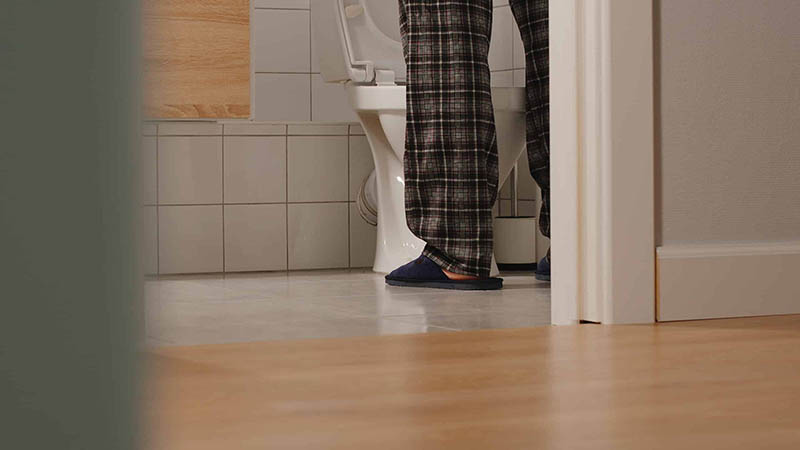Nocturia: The Causes of Frequent Nighttime Bathroom Visits
By: Stephen Kappa, M.D.
It’s important to get your steps in every day. But if you find you’re getting more and more of those steps in after midnight – every night – it might not be so healthy.
Having to get up multiple times at night to go to the bathroom, which is called nocturia, could be a sign of a urinary health condition. It’s not the same as having to urinate more frequently during the day, if you can still sleep through the night without going to the bathroom. Nocturia – Latin for “night” – is strictly a twilight occurrence.
There’s a good chance you know someone who lives with nocturia; it affects more than half of anyone older than 50, and up to one in three people older than 30.
Two Urinary-System Causes of Nocturia
A number of health factors can contribute to nocturia, including diabetes, high blood pressure, and heart disease. But for many patients, the cause is an interrupted bladder function and/or decreased bladder capacity, typical symptoms of other urinary-system conditions.
Among women, nocturia might be brought on by childbirth, menopause, or pelvic organ prolapse, which are common contributors to overactive bladder. In men, the cause might be an enlarged prostate, or benign prostatic hyperplasia (BPH). Here’s why:
- Overactive bladder (OAB) – This condition occurs when muscles involuntarily force the bladder to squeeze out urine, typically before it is full, prompting a sudden need to urinate immediately. Nocturia is not the same as OAB, but OAB is a major risk factor of nocturia because over time OAB reduces bladder capacity, including at night. It is possible to have both conditions.
- Enlarged prostate (BPH) – The prostate is a small gland that sits below the bladder and surrounds the urethra – the tube that urine passes through. When prostate tissue grows, it can compress the urethra and slow or block urine flow from the bladder. As a result, the bladder doesn’t fully empty, triggering the need to go more frequently but in smaller, weaker volumes. Like OAB, it is possible to have both nocturia and BPH.
Other urinary causes of nocturia include urethral scarring, which narrows urine’s passage, and bladder swelling or obstruction. With most conditions, the common symptoms of nocturia are the same: Having to take two or more bathroom trips at night, which in turn cause fatigue and sleepiness.
Nocturia Is A Wakeup Call
If you have the symptoms of nocturia, you should not sleep on it. Untreated, the underlying causes – BPH in particular – will progress and could develop complications.
Treatment Options That Can Help You Sleep at Night
Regardless of the cause of nocturia, take comfort in knowing that several treatment options are available, starting with non-invasive Kegel exercises and/or medications.
If your urinary retention issues do not improve with these approaches, you can ask about a range of leading-edge surgical treatments, including UroLift implants for BPH and Botox injections for OAB. We offer many options so you can choose the approach that best suits your lifestyle, needs, and comfort level.
That first step toward treatment could be one of the healthiest you make, especially if you’re taking too many steps at night.
Want to learn more? Our website offers complete overviews of BPH and OAB, including symptoms and treatments. If you’re curious to understand more about nocturia and BPH, read our earlier blog on the topic.

